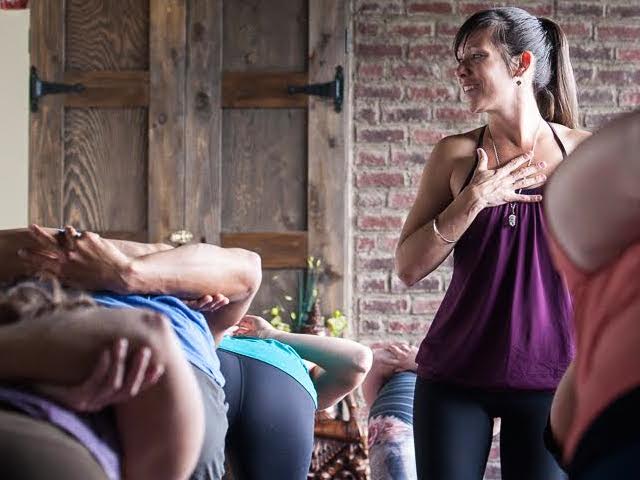They say, choose a job you love, and you will never have to work a day in your life. I believe this to be true—to an extent.
When I decided to invest the time and money into a yoga teacher training there was no question in my mind that I was going to teach yoga for a living.
There was one day during this first training that we talked about some of the realities that awaited those of us who were planning to turn yoga instruction into a job. We learned that as new teachers, it was unlikely that we would make a sizable income. New teachers must first build experience, but gaining this experience can be challenging.
Often this means teaching yoga wherever someone will open the door to new instructors, which are typically fitness centers and gyms. While these are great places to wet your feet and develop teaching skills, they usually do not pay as well as dedicated yoga studios. And for those of us lucky enough to get accepted to a studio straight away, it is not uncommon to assist experienced teachers for a few months, which pays very little. I accepted my teachers’ advice of keeping other avenues of income open to pay the bills as I grew as a teacher.
We were also warned not to pretend to know more than we did. As the years have gone on, I am so grateful this was something my teachers took time to say to us. We can’t, especially in the beginning, be expected to know everything—all of the anatomy, the Sanskrit, the philosophy, the energetics, the history, the therapeutics.
My teachers advised us to simply be confident in what we knew and not to pretend to know more than we did when we finally began teaching students. Experience and knowledge are developed over time, and it is important to recognize that we are not doctors, physiotherapists or psychologists (unless of course you are)—we are yoga teachers, and it is okay to admit when you don’t know something.
We leave teacher training with an awareness of how to safely guide students into the form of the basic poses. But the reality is that during training, our experience of teaching is instructing other, bendy-flexy, body-aware yogis who have likely had years of practice. This is not who we would end up teaching for the most part, which takes some adjustment.
Applying for a job teaching yoga is a quite unlike applying for other types of employment. It is it helpful to curate a resume that outlines trainings and applicable experience, but is just as important to make an effort to show up in the flesh.
Many positions accept applications online, but in my experience sending off an email and a resume to teach yoga is not going to set you apart from all the other keen and aspiring yogis, and there are a lot of us out there. Particularly if you want to teach in a studio setting, it is best to show up at that studio, introduce yourself to the staff and administration, and then show them your practice, your heart and your love of yoga.
Now as I look back on my own experience, I have created a list of five things that I would offer to new teachers for consideration in addition to the above advice as they seek to turn a passion for yoga into a sustainable career
1. Teaching yoga is a career rooted in customer service.
In my opinion, you really have to love people and working with them to be a great teacher. Be prepared to have your buttons pushed. You will need to develop patience and set clear personal boundaries. Students come in all shapes and sizes, with all kinds of expectations and requests. Being a yoga teacher is not only about teaching asana, pranayama, and philosophy, you will have to deal with all kinds of bookings, transactions, set up, clean up and a ticker tape of requests that may range anywhere from “I’m really busy this week can I come to class 10 minutes late?” to the extreme, “can I bring my four-year-old to your yin-restorative class?”
Being in a service industry job takes patience and you have to continue to remind yourself that ultimately we teach to serve.
2. You won’t know how to authentically use your own voice until you get out there and start using it.
Learning anything new is best refined through the practical ground of experience. We need time and practice to become strong, inspiring teachers. It takes time to create meaningful sequences, to learn the subtleties of timing, to continually address conscious breath, to adjust plans on the fly when unexpected new students arrive, and to weave a theme seamlessly through the experience so students leave feeling like they have been delivered the whole yoga meal deal. To develop these skills, we need to start by actually using our voice until the words naturally spill forward.
If we are lucky, we also have had strong teachers of our own that supply us with a toolbox that includes clear cues, keen eyes of observation, and hopefully a sense of class arc in terms of how to safely warm bodies up, bring the class to a peak and wind it all down. Use that toolbox.
3. You will hit slumps and get super tired of yoga.
There will be times that finding motivation for personal practices will be difficult. For me, this is a sign that I am not paying attention to the shifts around me, in the seasons, or in my life.
Self practice is an important time to reconnect. Taking time to shift the focus, tempo, or style of my practice can be a huge gift in re-igniting inspiration. After all, we cannot serve from an empty cup. Sometimes our practice simply moves toward meditation or study of philosophy. The point is it doesn’t really matter what your practice is, just that you are remembering to make time for some kind of practice for yourself.
4. Not everyone is going to be down with what, or how, you teach.
I’m sure there are huge and notable teachers that you don’t completely resonate with either. Does this mean they do not have an incredible gift to share with the world? No. The universe is abundant and we must believe that if we seek to share from a true place of love and service that the right people with show up for us. Comparison is the thief of joy. Each of us have a unique gift and we must be brave enough to share from an authentic place.
5. Teaching yoga will fill your heart more than you could ever anticipate.
The essence comes back to union. Through the evolution of your work, you will find more connection than you may even be prepared for—connection to yourself, to the community you serve, to the rhythm of nature and the undercurrent that draws it all together.
Turning a passion for yoga into your job is not for the faint of heart, but for those of us who are called to brave the journey, it is well worth the work.
If you are just setting out on this journey be confident. Even if you have not logged many hours teaching, remember that you have all kinds of gifts to share, and this is just the beginning.
Author: Chelsea McCormack
Image: Wes Eisses
Editor: Callie Rushton







Read 0 comments and reply